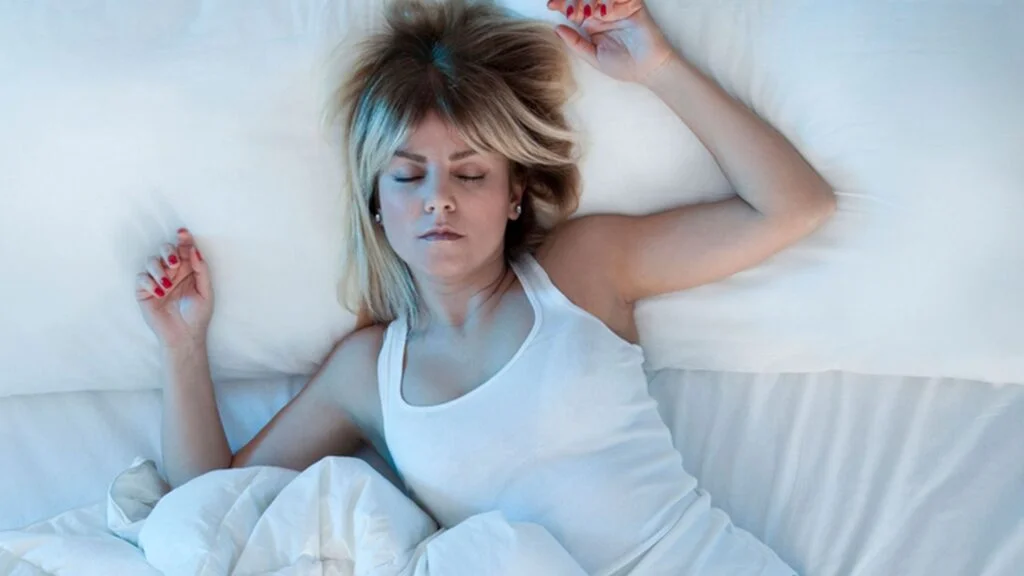
One of the biggest contributors to a good night’s sleep is temperature management, and anyone who has ever woken up hot and sweaty knows that all too well. In fact, sleeping hot is one of the most common sleep complaints. That’s because there are a lot of things that might be contributing to overheating, including your room temperature, your choice of bedding, your pajamas, your pre-bed activities, potential hormonal changes, and the list goes on.
Luckily, there are steps hot sleepers can take to enjoy cooler, more comfortable nights. We quizzed a few sleep experts for common causes of sleeping hot, and more importantly, proven solutions to help you get better sleep.
Why Do I Sleep Hot?
If you’re struggling with overheating at night, there are a few culprits worth identifying.
Your Body’s Natural Thermoregulation
Overheating at night can partly be blamed on simple biology. The circadian rhythm controls body temperature, which begins to dip about two hours before sleep (1). “When that occurs, the skin temperature may rise to help release heat,” Dr. Carlea Weiss, PhD, MS, RN, and sleep scientist, tells Sleepopolis. “That is often why people feel they get hot during sleep.”
Fluctuating hormones can also lead to uncomfortably hot nights because they affect the body’s ability to regulate temperature. Estrogen and progesterone are reproductive hormones with an outsized role in body heat regulation. When they swing due to pregnancy, menopause, ovulatory cycles, or thyroid issues, it makes it harder for the body to maintain a stable internal temperature. That’s what leads to symptoms like hot flashes and night sweats.
Bedroom Environment
What’s going on around you can also interfere with the body’s ability to cool down, beginning with ambient temperature in your bedroom. “The best temperature varies from person to person, but optimal sleep generally occurs in cooler temperatures,” Audrey Wells, MD and founder of Super Sleep MD, tells Sleepopolis. “Personal preference, age, health conditions, and climate (including humidity) can influence what feels comfortable.” The general recommendation for optimal room temperature is somewhere between 60 and 67 degrees Fahrenheit. Sleep temperatures north of that range make it difficult for the body to self regulate. In fact, based on survey answers from 765,000 participants in a 2017 study, that’s why so many people struggle with abnormal sleeping patterns in the summer (2).
High humidity can also pose an issue, particularly when it’s accompanied by warmer temperatures. When there’s a lot of moisture in the air, sweat doesn’t evaporate efficiently (3). Sweating is one of the body’s main cooling mechanisms, and when it doesn’t work as intended, you’re left feeling sticky and uncomfortable, which isn’t conducive to restful sleep.
Then there’s the airflow factor. If you sleep in a room with poor ventilation or air circulation, it traps heat and humidity and keeps an elevated body temperature, well, elevated. Not only is that uncomfortable, it can make it next to impossible to fall and stay asleep.
Your Mattress and Bedding
Cozy pajamas and blankets may be satisfying at first, but they can elevate your skin and core body temperature faster than you’d think. That can mean fragmented sleep, notes Weiss, which is when you wake up repeatedly in the night because you’re overheated and then struggle to fall asleep again.
Your mattress and bedding can also be inadvertently contributing to hot, sweaty nights. Synthetic materials and fabrics, like memory foam and polyester, are incredibly dense and notorious for trapping heat. They don’t allow air to circulate, so your body heat has nowhere to escape. Eventually, you begin to overheat and often start sweating — creating moisture that also gets trapped, because these materials don’t wick well. Mattresses, pillows, and comforters made with materials that insulate without promoting airflow and hold onto moisture can leave you tossing and turning, looking fruitlessly for a cooler, drier spot.
Lifestyle and Health Factors
What happens before you climb into bed can affect your body temperature as well. While exercise can actually support healthy sleep (4), you need to time it properly. A heavy workout that makes you sweat right before lights out can mean a higher core body temperature. “Relaxing activities such as yoga and stretching are better options before bed,” says Weiss.
Sexual activities, meanwhile, can elevate your heart rate and core body temperature in the same way as vigorous exercise. Remember, the body needs to cool down for sleep, so some people may find this a hurdle to drifting off. On the other hand, sex can help promote relaxation, which may make it easier for other people to fall asleep.
But it’s not just physical activity that can affect your sleep. That afternoon latte, evening nightcap, or spicy Thai takeout may come back to haunt you come bedtime. Weiss says that caffeine is a stimulant drug, so it increases core body temperature (5 ) — and with a half-life of about five hours, it hangs out in your system longer than you’d think (6). As for alcohol, Weiss cautions that it has a rebound effect and can affect key sleep stages like deep sleep. “Even though it can make people sleep, once it’s metabolized, it increases cortisol levels, negatively impacting sleep,” she says.
Spicy foods actually trick the body into thinking it’s hot, so it starts sweating in a bid to cool down. It’s because of capsaicin, the compound in chili peppers that binds to heat receptors in the mouth and skin and creates a burning sensation. At bedtime, that excessive sweating and elevated body temperature can make it hard to drift off.
Can’t shut off your mind at night? Stress and anxiety don’t just mean racing thoughts. They also mean a rise in cortisol levels. Weiss notes that this can also increase core body temperature and harm sleep.
Some medications and medical conditions also contribute to overheating and night sweats by affecting thermoregulation. Weiss notes that stimulants, beta blockers, antidepressants, and anti-seizure medications can all influence body temperature. Hyperthyroidism and low blood sugar, meanwhile, can contribute to heavy sweating at night.
Signs You’re Sleeping Too Hot
If you’re waking up in soggy sheets or pajamas, it’s pretty easy to pinpoint overheating. But other signs that you’re sleeping too hot can be more subtle and easy to attribute to something else. Tossing and turning all night can be a clue that you’re trying to find a cooler spot in bed. Even when you don’t completely wake up, this kind of nighttime disruption affects your sleep quality and can leave you feeling less rested.
Waking up thirsty or needing extra water in the night is another red flag. That’s because excessive sweating overnight leads to fluid loss and sets up a pretty vicious cycle. “Dehydration reduces the ability to tolerate heat, as the body produces less sweat and may also have a reduced skin blood flow,” says Weiss. In other words, it leaves you trapped in a cycle of overheating.
Some hot sleepers wake up in the mornings feeling groggy, foggy, or with a headache. That’s often the result of sleep disruptions, dehydration, or insufficient time in restorative sleep phases. Vivid dreams and nightmares can also be a sign of overheating.
The Best Solutions for Sleeping Hot
Once you’ve figured out why you’re overheating at night, you can take steps to cool things down for better sleep and more comfortable nights.
Optimize Your Sleep Environment
First things first: Make sure your sleep space is appropriately cool and ventilated. Lower the thermostat or air conditioning or try cracking a window. Blackout curtains can help block daytime heat from building in your bedroom, and an oscillating fan can keep air moving.
Upgrade to Cooling Sleep Products
Take a good look at your mattress and bedding. If you’re sleeping with synthetic fabrics and materials, upgrading to breathable options could be a game changer.
A new bed is certainly an investment, but if it’s time to replace yours anyway, look for a cooling mattress. Hybrid constructions promote airflow better than all-foam models, and some materials are simply a better call for hot sleepers. Natural latex is an excellent material for pressure relief (it’s comparable to memory foam in that regard), but it stays temperature neutral, meaning it won’t trap heat. If you prefer the feel of memory foam, look for gel-infused versions with cooling technology that help combat heat retention. A wool layer is a great addition as well; the fiber is impressively breathable, temperature regulating and moisture wicking, so it’s a great option for hot sleepers. If a new mattress isn’t in the budget, a breathable topper can be a temporary workaround.
A less expensive fix is swapping out synthetic sheets for breathable fabrics, like percale, linen, viscose from bamboo, or Tencel. These kinds of cooling sheets promote airflow, which can keep your sleep space from getting too stuffy. Switch to lighter pajamas too, or try sleeping naked, especially if you think hormonal fluctuations could be part of the issue.
Consider your pillow and comforter as well, especially if you routinely wake up sweaty. Down is luxurious, but it’s very insulating and it doesn’t wick moisture, so it can create a hot, sweaty microclimate. Cooling pillows made with gel layers, shredded foam, or interior airflow channels can offer some relief. And again, wool is a great choice in pillows and comforters alike because its natural characteristics make it really suitable for a cooler night and better sleep.
Smart Nighttime Habits
Since what you do before bed plays a role in the night to come, be mindful about creating good habits. Move your intense workout to earlier in the day, skip the alcohol and limit heavy meals before bed, and don’t indulge in caffeine from late afternoon on. Make sure you’re staying properly hydrated throughout the day and into the evening as well, but avoid drinking too much water immediately before bed. Otherwise, you may find yourself waking up to use the bathroom.
In the evening, consider creating a relaxing bedtime routine to wind down and de-stress. Light stretching, a cool shower, or some meditation are good options.
When to See a Doctor
In some instances, your very best efforts aren’t going to ease nighttime overheating or sweating. If your night sweats are persistent or you suspect that medications, hormonal imbalances, or medical conditions might be the culprit, reach out to your doctor about what might be done.
Quick Cooling Hacks for Hot Sleepers
- Take a cool shower or use cool water to wash your face or even your feet before hopping into bed.
- If it’s really hot when you get into bed, bring a frozen water bottle or cooling pad to bring down the temperature of your sleep environment.
- Wear moisture-wicking pajamas so you don’t get too soggy.
- Switch to breathable sleepwear fabrics like bamboo or cotton. They won’t trap heat like polyester or rayon.
Conclusion
It’s reassuring to know that sleeping hot is not only common, but also preventable in most instances. Start sleeping cooler by assessing your sleep setup with an eye toward airflow and breathability. That may involve swapping out your sheets, springing for a new pillow comforter, or even upgrading your mattress, but it could be as easy as lowering the room temperature and switching on a fan. Remember that your daytime and bedtime habits can also play a role in overheating at night, so think through any adjustments you can make there. Don’t hesitate to seek medical assistance if your nighttime overheating issues are beyond your ability to manage. That’s usually the case if they stem from medical conditions, hormonal fluctuations, or medications.
Want to find your perfect cooling mattress or bedding? Check out our expert-tested guides to the best cooling sleep products.


























